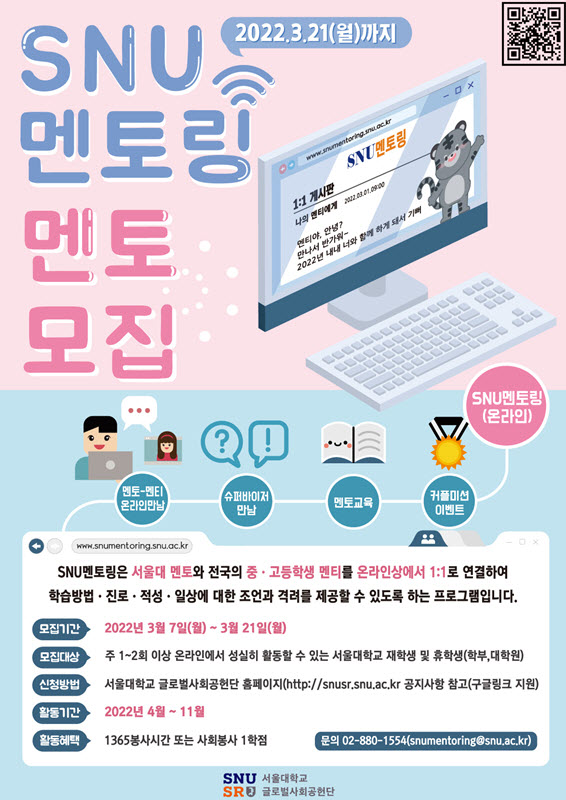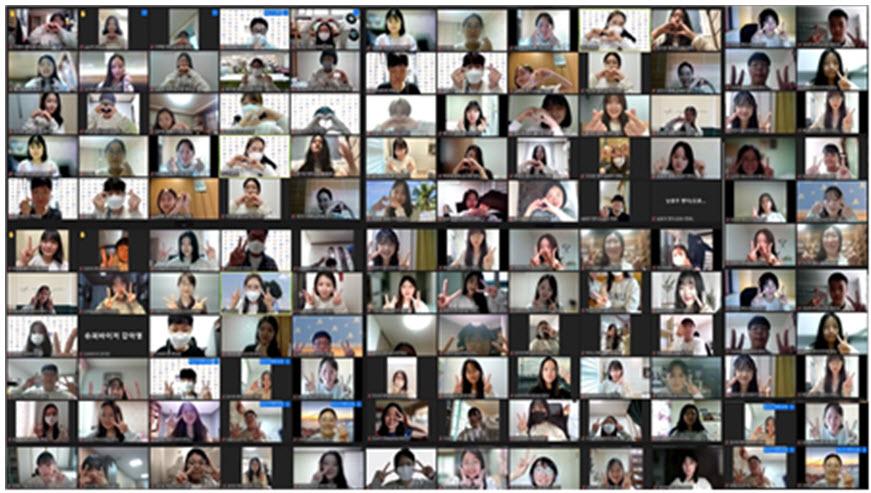The SNU Institute for Global Social Responsibility (SNUSR) runs a wide variety of volunteer programs that help meet the needs of the community. One of them is SNU Mentoring, an online mentorship between SNU students and teenagers. Each year, about 150 SNU mentors lend a helping hand to middle and high school students who are having trouble in their school life.
SNU Mentoring began in 2009, a time when many Korean households were struggling with financial problems in the aftermath of the so-called “Great Recession,” the global financial crisis of 2008. In the face of such hardships, SNUSR decided to assist the children of these households with their school life. Although it started off as a one-time project, SNU Mentoring has continued for 14 years and has become one of the central programs of SNUSR.

SNU Mentoring’s mentor-recruiting announcement (2022)
The Yearly Schedule of SNU Mentoring
SNUSR runs the mentoring program following a one-year cycle, which begins every March with the recruitment of new mentors. Each mentor is then assigned to a mentee. Mentors and mentees maintain regular communication, usually once a week or twice a week, through the SNUSR online message board (https://snumentoring.snu.ac.kr). Mentees select their preferred discussion topics, such as school life, friendship, studying tips, careers, and so on. Mentors participate in training seminars on how to effectively give advice to adolescents.
During summer vacation, mentors meet in person with mentees on campus, where mentors become tour guides, introducing and promoting SNU to the mentees. Unfortunately in 2021, the campus tour was canceled and was replaced with a Zoom meeting due to the pandemic. The mentorship formally comes to an end in November, with a follow-up feedback session taking place in December. This session is used as a reference for making improvements for the next year’s mentoring program.

The Zoom meeting between mentors and mentees (2021)
Mentoring Supervisors: Mentors of the Mentors
During the mentoring sessions, mentors sometimes face circumstances that are difficult to handle by themselves. For instance, mentees can become demotivated and fall out of touch, and some may suffer from serious issues such as domestic violence or school bullying. Since mentors are not qualified to offer solutions to such problems alone, trained supervisors are there to provide advice and support to the mentors. Supervisors are also SNU students (undergraduates in their third or fourth year and graduate school students), but unlike mentors they have received additional training in counseling. The supervisors monitor the message board and advise the mentors on how to build a better relationship with the mentees.
Sujin Yoo (Department of Ethics Education), one of the mentoring supervisors, commented that SNU Mentoring is a program where mentors, mentees, and supervisors can all support each other and develop an attitude of sincerity. She recalled that one good function of the mentorship was that it let the participants talk frankly about themselves. “Many mentors and mentees gradually grow intimate, learning to share the most trivial bits of their daily lives. I believe that through this process, they start to reflect more on themselves,” Yoo said.
Due to growing interest in SNU Mentoring, the number of participating mentees is on the rise every year, while there are relatively fewer mentors. Accordingly, some of the mentors currently need to take care of two mentees each. Yoo thus hoped that more SNU students would apply as mentors. “Many students are concerned that mentoring is a time-consuming activity, but SNU Mentoring is not. Just a few minutes spent each week on writing one online post can provide a great boost for mentor and mentee alike,” she said. As one SNU student mentor says, “the best teachers of mentors are the mentees.”
Written by Seunghwan Oh, SNU English Editor, ascendhwan@snu.ac.kr
Reviewed by Professor Travis Smith, Department of Asian Languages and Civilizations, tlsmith@snu.ac.kr

